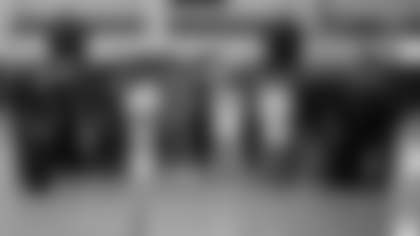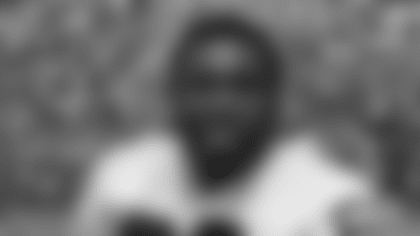For the past few years, the NFL, United Way and EVERFI have worked with the league's 32 teams to offer Character Playbook LIVE, a program to help students engage in productive conversations on character and cultivating and maintaining healthy relationships.
The Steelers have always been a part of them, and on Tuesday reached out to the community to offer multiple programs for kids, including the first ever Character Playbook LIVE HBCU Appreciation event. The virtual event, presented by the Steelers and the United Way of Southwestern Pennsylvania, was an opportunity for area students to learn about Historically Black Colleges and Universities (HBCU) from those who attended them, or are currently attending one, as well as others with strong relationships with the schools.
One of the key panelists for the event was newly minted Pro Football Hall of Famer Donnie Shell, who attended South Carolina State University and went on to play 14 seasons with the Steelers and was a part of four Super Bowl teams in the 1970s. Shell made the Steelers as an undrafted rookie free agent and went on to find incredible success with the black and gold, including being a member of the Hall of Fame's Class of 2020.
Shell credited his success in sports and life in general not just to talent, but to the lessons he learned at South Carolina State as well as the guidance he received there.
"It gave me a sense of responsibility," said Shell. "The thing I needed the most, and I don't think I would have made it at a Division 1 school, because I needed nurturing and mentoring. I remember my professors and coaches were great mentors for me. I wanted to be a teacher and a coach when I graduated. I wanted to build back into other young people what I got from our coaches and teachers. South Carolina State University did a great job of mentoring and encouraging me that I could be whatever I wanted to be, do whatever I wanted to do with the right teaching and character. It helped me to treat people with respect. I saw a lot of that on the campus of South Carolina State University. Coach Willie Jeffries really harped on us about that. It was a big issue for us as athletes.
"It bodes well for other HBCUs when we do well and go on to the pros and have success, and others to look at HBCUs and know you can be successful. HBCUs have a hidden gem in relationship building. I had a great time building relationships and it bodes me well now."
Shell was joined on the panel by Brandon Hunt, the Steelers Pro Scouting Coordinator, Gia Thorpe, a Pittsburgh native and junior guard on the Howard University Women's Basketball team, LaRae Holliday, the Global Head of Talent for EVERFI and Spelman alumna, and moderator Dr. Damion Thomas, the Curator of Sports at the Smithsonian National Museum of African-American History and Culture.
The discussion ranged from why individuals choose an HBCU for their education, to what their best experience was and much more.
"I went to South Carolina State University because my parents couldn't afford to pay for my college education," said Shell. "South Carolina State University offered me a half scholarship in baseball and a half scholarship in football. That made a full scholarship. That is why I accepted. And back in the early 70s, we couldn't go to predominantly white schools. It wasn't integrated. It was during the integration time and we couldn't go to the white universities."
For Hunt, who has family members who got an HBCU education, his education to the schools came in a different manner – from former Steelers scout extraordinaire the late Bill Nunn. Nunn was known for scouting players from HBCU's like nobody else, finding gems that others ignored, including multiple Hall of Famers like Shell and John Stallworth.
"It all goes back to the history of scouting here at the Steelers," said Hunt. "The 1974 roster, there were 10 HBCU members and three are in the Pro Football Hall of Fame, Mel Blount (Southern), Donnie Shell, and John Stallworth (Alabama A&M). There is one gentleman who was pretty much responsible for how that went down, and that was Bill Nunn.
"He started in journalism and ended up being a scout, worked his way up through the organization. He is a graduate of West Virginia State where he played basketball. What Bill Nunn pretty much did was open up and trailblazed the roads in scouting. He went into the HBCUs at the time the scouts and teams weren't as much, and he did some extra digging. He went in and spent extra time. He would accidentally stay an extra day, get extra tape, getting extra times, do the extra work to look for the diamonds in the rough. With technology today there isn't as much of that, but guys like Bill Nunn would. He would stay with coaches and staff members, for safety sometimes, but also to get more information on players."
Thorpe was the only panel member currently enrolled at an HBCU, and she said after going to predominantly white schools growing up, her experience at Howard is broadening her horizons.
"Attending Howard has given me a voice," said Thorpe. "I feel like I was silenced a lot of my childhood and it gave me the opportunity that, no, speak up. If something is wrong, say it. It also gave me an opportunity to have black friends. I never really had that either. As an athlete you want to be able to play basketball but have the education as well and have a cultural experience. I was able to get all of that in one.
"It builds leaders. I don't know how else to say it. The voice I have now, I have seen so much growth in myself the past two years and I am excited to see what else can come."
After the group spoke, the students had an opportunity to ask questions, with one coming from Urban Pathways School in the Pittsburgh area. The student asked Shell how athletes from the past would react to the social justice protests of today.
"I think they would react very positively," said Shell. "As a matter of fact, I was in one as a teenager coming up in the late 60s, early 70s. We marched for our rights. I remember two white guys came from New York and organized the march. I think athletes from that time would react very enthusiastically, especially seeing the athletes use their platform now. When we marched, it was mostly black people marching. Today when I am observing the marches, it's people of different cultures."














